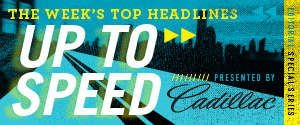Editor’s note: CultureMap Dallas has partnered with the Lone Star Film Festival to publish a series of filmmaker interviews conducted by LSFF organizers.
Life Partners screens at the 2014 Lone Star Film Festival in Sundance Square on Thursday, November 6. The film, selected for the Sundance Screenwriters Lab in 2012, tells the story of two co-dependent friends — one a lesbian, the other straight — whose almost marriage-like relationship falls under pressure when one enters a serious relationship.
Lone Star Film Festival organizers discussed the film with co-writer/director Susanna Fogel, who described the process of casting leading actresses Leighton Meester and Gillian Jacobs, as well as editing the film post-Defense of Marriage Act.
Lone Star Film Festival: Are there any films or filmmakers that inspired you to make the film?
Susanna Fogel: As writers, Joni and I are longtime fans of Nicole Holofcener for the way she captures female friendship in all its dysfunctional glory, so I will always cite her first. Honestly, there's such a dearth of movies out there about girl friendships that are genuinely funny and real and resonant, so a lot of my references are films made by male directors about male friendship.
Writer/directors like Greg Mottola and Cédric Klapisch (L'Auberge Espagnole, Russian Dolls, among others) are really inspiring tonally. Both have an uncanny ability in all their films to nail a combination of easy, naturalistic chemistry between actors and a deliberate aesthetic that makes you feel like you're in good hands as a viewer.
In other words, they make films that are also "movies," if that makes sense. I tried to do as they do, while bringing our very specific, hopefully- Zeitgeisty female sensibilities to the table.
LSFF: The film is about two best friends, and you wrote the screenplay with one of your best friends, Joni Lefkowitz. Can you describe the writing process for this film particularly?
SF: The process of writing this film was a complicated and somewhat epic one, so you've been warned that this will be a long answer. Life Partners began as a short play we wrote as part of a play festival called "Unscreened," which was the brainchild of our producer, Jordana Mollick. The play initially centered on political inequality in a friendship — namely, the pact a straight girl makes with her gay friend that she won't marry until gay marriage is legal and how that is tested when the straight girl enters a serious relationship.
After the play was well-received, we expanded it into a feature screenplay and workshopped it with the Sundance Screenwriters Lab, where we focused on deepening everything outside the politics. We delved into the essential nature (and dysfunction) of this co-dependent friendship to try to create a real portrait of two best friends growing apart as they approach 30 and a significant other comes between them.
With the support of Sundance and IFP, we were lucky enough to find financiers who believed in us, but rather than riding off into the sunset — or "the set," as it were — with a financed film, we then faced an unforeseen complication on the eve of shooting when there started to be rumblings that DOMA was about to be overturned.
As writers of a movie almost entirely populated by women and lesbians, we were obviously thrilled with this potential news, especially since it meant Joni would be able to like, marry her wife and stuff. But at the same time, as the director, I started to panic that the movie I was about to shoot was going to become a period piece by default and that the politics would supersede the more important friendship story that was supposed to feel current.
Nonetheless, the preproduction train had left the station, so we decided to shoot the film as scripted and deal with it once we got the verdict. DOMA was overturned the day we screened the rough cut of the film. Realizing we had to think outside the box, we experimented with cutting all the scenes with the political storyline, just to see if we still had a movie there and were relieved to see that we did. In fact, it became a more timeless story about friendship.
As a writer/director, this was a really profound moment for me because it proved the old adage that you write your film three times: in script, on the set and in the editing room. Ultimately, we're so proud to have made a post-DOMA movie, but I'm still marveling at the meta plot twists in the story of how this film got from script to screen.
LSFF: You and Joni also write for television, most recently on the show Chasing Life. How different is the process from writing a film?
SF: Very! The most notable difference is the pace. With television, you're writing scenes that shoot mere days or hours later, which is an incredible adrenaline rush and a great complement to the languid process of writing a film that won't shoot for another year or years or ever (not to be depressing, but you know).
On the flip side, in television, particularly if you're juggling multiple episodes of a show at once like we do on ours, you just don't have the time to obsess over the material, which for a director-type (I was going to say "an obsessive," but figured I'd opt for the more flattering self-description) can be physically painful. There's something about the specificity of voice you can achieve with a film you spend months on that is uniquely rewarding.
In this case, I was lucky enough to be working on the show by day and editing this film at night, which I like to think upped my game in both arenas. Thinking big-picture about the film because that's how we operate in the TV writers' room certainly gave me perspective on the movie, while the micro-focus of editing the film in the wee hours of every morning certainly forced a level of attention to detail on the show, despite my exhaustion.
LSFF: What was it like trying to cast the perfect "Paige and Sasha" (not to mention the supporting cast)?
SF: Ultimately this movie is a love story, albeit a platonic one, so Paige and Sasha's chemistry was maybe the most important thing we had to get right. This was terrifying: My task, basically, was choosing two strangers who have never met prior to filming and convince you that they have had years of history, baggage and a shorthand. And the problem with casting actors who are in-demand for a low-budget film with a first-time director is that you can't expect them to come in and audition in different pairings until you get it right.
As a director, your role is basically the same as a romantic matchmaker: You meet people individually over coffee, get a read on them and then just guess about who's going to click. In this case, after awkward coffees with Leighton and Gillian, it was undeniable that they were two smart, down-to-earth, girl-girls with great senses of humor.
So we took a leap of faith. But — and I can say this now — it wasn't until the table read, when they instantly gave each other bizarre nicknames, started talking in terrifying baby voices and traded gossip about mutual friends, that I exhaled and went, okay, this is going to work.
Another thing I loved about both of these actresses in these roles is that they're both playing a little out of the box, type-wise. One of the most exciting things about directing, for me, is seeing a quality in a person that is not what they lead with in most of the roles they've played. Finding the hidden layers of an artist and showcasing them.
In Leighton's case, a tomboy lesbian is the opposite from every role I'd ever seen her do, but it utilizes her real-life, low-key and blunt intelligence in a totally new way onscreen. I'm so thrilled for people to see her in this part and really acknowledge her incredible range.
And in Gillian's case, she's a Juilliard-trained actress who's done amazing work in both nuanced drama and broader cult comedy, but I had never seen her do something in between like Paige — more of a relatable, neurotically funny every-girl type, which is so much of who she is in person.
Overall, it felt like this was an exciting opportunity to show the world other sides of two actresses who should never just be playing the girlfriend in movies.
---
The 2014 Lone Star Film Festival takes place November 5-9 in Sundance Square in Fort Worth. For more information, visit the festival website.
















































 Please verify your e-mail by following the link we just sent you.
Please verify your e-mail by following the link we just sent you.












